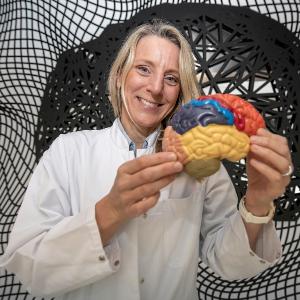Multiple sclerosis: early warning signs in the immune system
30 Sept 2024
LMU researchers show that certain immune cells already play an important role in the early stages of multiple sclerosis (MS).
30 Sept 2024
LMU researchers show that certain immune cells already play an important role in the early stages of multiple sclerosis (MS).

A team led by Lisa Ann Gerdes has examined identical twin pairs. | © LMU Klinikum
Multiple sclerosis (MS) is a chronic inflammatory disease in which the immune system attacks the central nervous system. This impairs the transmission of signals between the brain and body and can lead to symptoms such as impaired vision, coordination problems, paralysis or even cognitive impairment. A team led by Lisa Ann Gerdes (Institute of Clinical Neuroimmunology at the LMU Hospital and Biomedical Center) has now examined identical - i.e. genetically identical - twin pairs and was able to prove that certain immune cells - so-called CD8 T cells - already play a role in the early stages of the disease.
CD8 T cells are known to be present in inflammatory foci in the brains of MS patients. Until now, however, it was unclear what role they play in the disease: Are they a consequence or a trigger, and what activates them to jump from the blood into the central nervous system? The researchers have now investigated these questions using a unique patient cohort: they compared the CD8 T cells of identical twin pairs in which one twin has MS while the other shows no clinical symptoms.
Twin cohort enables analysis of high-risk patients
Both genetic and environmental factors play an important role in MS. Identical twins, in whom these factors are largely the same, therefore represent a valuable comparison group. As the healthy twin has an up to 25% increased risk of also developing MS, early stages of MS in particular can be better investigated with this patient cohort. "It offers a unique opportunity to examine high-risk patients before the disease becomes apparent," says Vladyslav Kavaka, first author of the publication.
The researchers analyzed CD8 T cells from blood and cerebrospinal fluid samples of the twin pairs using innovative methods such as the combination of single-cell RNA sequencing and T cell receptor analyses. Their results show that CD8 T cells with the same specific changes are found in MS patients and people with early signs of the disease: The cells exhibited increased migratory capacity, were pro-inflammatory and highly activated. "These characteristics show that these CD8 T cells are migratory in the blood and are already on their way to the central nervous system, so to speak, where we find the same cells again," explains Dr. Eduardo Beltrán, one of the lead authors. The researchers also found this cell type in the brain tissue of MS patients, which indicates that the changes in the CNS persist.
Early stages of the disease already visible
According to the authors, it is particularly remarkable that the same CD8 T cells were not only found in people with already diagnosed MS: they were also found in people who do not yet show any clear clinical symptoms, but in whom there are signs of subclinical neuroinflammation - i.e. inflammation that does not cause clinical symptoms. This suggests that these cells could already play a role in the earliest stages of the disease - probably long before MS can be diagnosed.
According to the authors, these findings could potentially open up new therapeutic approaches in which the function of CD8 T cells is specifically influenced in order to slow down or prevent the progression of MS. In addition, CD8 T cells could be used to develop new diagnostic methods that allow MS to be detected at a very early stage before irreversible nerve damage occurs.
V. Kavaka et al.: Twin study identifies early immunological and metabolic dysregulation of CD8+ T cells in multiple sclerosis.Science Immunology
Contact:
PD Dr. med. Lisa Ann Gerdes
Institute for Clinical Neuroimmunology
LMU Hospital
LisaAnn.Gerdes@med.uni-muenchen.de
https://www.neuroimmunology-munich.de/our-labs/gerdes-lab-ms-twin-study/0110b5938ea4c956